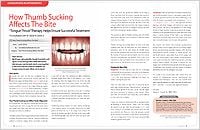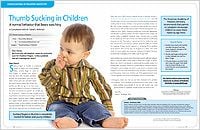

Sucking on a thumb or finger is a completely normal habit that some babies develop even before they’re born. It’s soothing, and it also helps babies make contact with and explore their environment. If sucking habits go on much past the age of 3, however, it’s possible that bite problems may arise.
In a normal bite, the upper teeth grow to overlap the lower teeth. But it’s possible for the pressure of a thumb, finger or pacifier resting on the gums to interfere with normal tooth eruption and even jaw growth. Some thumb-suckers develop an “open bite,” meaning the teeth don’t overlap when a child bites together (View Example); instead, there is an open space between the upper and lower teeth. That’s why thumb sucking is definitely something we should keep an eye on, though we don’t want to intervene too soon.
It’s important to keep in mind that most children break thumb-sucking habits on their own between the ages of 2 and 4. So if you’re trying to get your child to stop, the first thing to do is simply ignore it. Pacifiers will usually be given up more quickly than thumbs or fingers. If your child seems unable to stop when it’s time, positive reinforcements tend to work better than negative (e.g., putting a bitter substance on the thumb). Here are some things you can try:
Thumb sucking is just one reason why it’s important to maintain your child’s regular schedule of dental exams, starting at age 1. At these appointments, you and your child can also learn effective oral hygiene techniques to help prevent tooth decay. Meanwhile, your child’s dental growth and development will be monitored. Though orthodontics can usually fix bite problems that result from sucking habits, we’d just as soon help you avoid this expense if possible!

How Thumb Sucking Affects The Bite Thumb sucking can actually block the front teeth from erupting fully and can also push the teeth forward — sometimes more on the side where the thumb rested. How far out of position the teeth end up will depend on the number of hours per day the thumb was in the child’s mouth and how much pressure was applied. When the pressure exerted by the thumb in the mouth is particularly strong and occurs over a long period of time, the forces can potentially influence growth of the jaws… Read Article

Thumb Sucking in Children Sucking fingers or thumbs is completely normal for babies and young children. In fact, babies actually begin to suck on their fingers or thumbs even before they are born. Yet it’s a habit that bears watching because it can influence the development of your child’s teeth and jaws if it goes on too long… Read Article

Dentistry and Oral Health for Children Dear Doctor magazine brings you this wide-ranging overview of milestones and transitions in your child’s dental development. Learn how to protect your children from tooth decay, dental injuries, and unhealthy habits while getting them started on the road to a lifetime of oral health and general well-being… Read Article